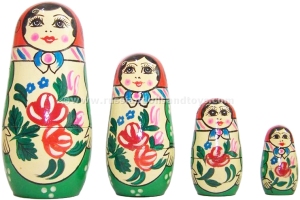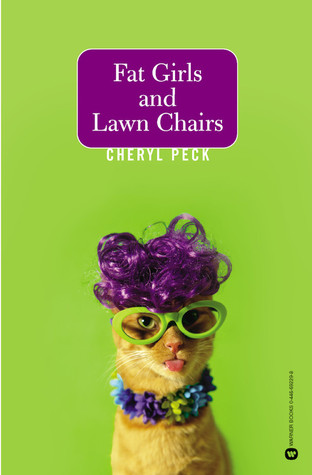Fat Girls and Lawn Chairs by Cheryl Peck
Self-Published in 2002, published by Warner Books, Inc in 2004
Genre: Mini Essays
*This book is part of my 2017 search to find positive representations of fat women in fiction or nonfiction, and that positive representation will not hinge on weight loss and falling in love. Thus, books will either meet or not meet my criteria, which will factor overall into my recommendations. I purposely use the word “fat” because it is not a bad word. Using plump, curvy, plus-sized, fluffy, big-boned, shapely, voluptuous, or any other term suggests that fat is bad and thus needs a euphemism.
If you look at that cover, you’ll see this book reinforces stereotypes about fat women being gaudy cat-lovers. I didn’t think of that when I bought it as part of my quest to find fat-positive fiction and non-fiction by and about women. Is Cheryl Peck obsessed with her cat? Yes, yes she is. She writes some essays from his point of view. They’re confusing. I never thought a cat would call toilet paper “bathroom string.”
I was excited, though, because Susan Jane Gilman, author of Kiss My Tiara, a beloved book I read more times that I can remember when I was 18-20, blurbed Fat Girls and Lawn Chairs, calling it “The literary equivalent of chocolate kisses…yummy, vital, and nearly impossible to put down.” I’m currently re-reading Kiss My Tiara to make sure 18-20 me wasn’t an idiot. I was not; it’s still fantastic.
I had a lot of up-and-down feelings while I read Peck’s collection, mostly stemming from the fact that I “get” what kind of person she is without her explaining it to the reader. Peck is from Coldwater, Michigan, and later moved to Three Rivers, Michigan. I know of both of these towns. In fact, Three Rivers isn’t far from my current home in Indiana. I, too, am a born-and-bred Michigan woman. When Peck writes about playing in gravel pits, I know what she means. When she hates on deer, a creature most see as beautiful and in danger of being shot by an evil hunter, I totally get that in Michigan deer are about as loved (and plentiful) as rats. They’re a massive nuisance, and dangerous. If you’re not from Michigan, however, what she’s saying might make zero sense because she’s not explaining herself. Ever.

Peck’s sense that we’re all in her head is the ultimate undoing of her essays. In “Moomeries,” Peck says she was trying to spot deer while driving in her truck. Her route took her next to Southern Michigan Prison, and she claims to have spotted an escaped inmate standing in the middle of the road. She tells the police. Believe it or not, this is a metaphor for a cow that got out of its pen. Here’s the problem: there really is a South Michigan Prison, the people inside are actually called inmates, and one would be wise to let the police know an inmate had escaped. When cows come into the conversation, I’m lost. I read this large opening paragraph several times, then called to my husband and read him the paragraph, after which he deemed it “doofy.”
The other confusing aspect of Peck’s essays is her unwillingness to name anyone. Instead, they all get similar nicknames: Least Wee, UnWee, Wee One, Weeest, Brother 1, Brother 2, and Beloved. Seriously? Even David Sedaris names his siblings, and his stories are terribly embarrassing. Peck is telling stories of her siblings doing normal-people activities. And I hate to admit how long it took me to realize Weeest is Wee-est (as in the smallest). I dragged out the word “West” like an idiot for quite some time.

Peck can be a fairly scratchy personality. She admits that her sisters were born quickly: first the author (Least Wee), 1.5 years later came UnWee, and 1.5 years later came Wee One. Then, When Peck was 12, Brother 1 showed up. The brothers are so much younger than Peck that she admits she didn’t even bother getting close enough to them to give them nicknames. She mostly tormented them for the sake of doing so, claiming, “We are fortunate [they] did not join the Neo-Nazis or the NRA.” Even the father was negligent. When the mother left to go to the store, the father forgot his son was in a bassinet and began doing home maintenance. When the mother came home, the baby was still swaddled, but covered in old plaster and bits of wood. I think I’m supposed to laugh?
Cherly Peck is a lesbian, though she almost skips over this facet of who she is. Whomever she’s dating (is it the same person?) is Beloved. There’s one essay called “How Many Lesbians Does it Take?” that’s so poorly written I’m not entirely sure what they’re doing. “The Go-Get Girl” starts with Peck’s memories of coming out at 27 and the same year attending the Michigan Womyn’s Festival in 1977. Instead of being an essay about coming out, Peck describes volunteering at the festival, during which she was supposed to fetch supplies for one food line, but a woman in a different food line was going faster, making Peck look bad. So many of the essays begin or end or tuck somewhere in the middle a nugget to be explored, but Peck focuses on the least meaningful part of an experience. The titular “Fat Girls and Lawn Chairs” is literally about a slightly fat friend whose lawn chair broke under her, and how the other attendees at the party wouldn’t stop laughing about it. Significance? I’m not sure either. These very short essays surprisingly lack much about being fat, either, which would be fine if it weren’t right there in the title.
Overall, Peck’s Fat Girls and Lawn Chairs reads like a good candidate for a memoir class, one in which a smart teacher would point Peck toward the gold to be meaningfully mined and away from the you-had-to-be-there tales you tell friends at dinner.


Wow, this sounds messy! it’s good that you could identify with her sense of place, but the rest sounds just kind of disjointed and underwhelming. Oh well, they can’t all be winners!
LikeLiked by 1 person
I knooooow. I kept reading despite not wanting to, mainly because the book was part of my 2017 reading project, but also because I was reading about 4 other books at the same time, so I was entertained elsewhere.
LikeLiked by 1 person
It sounds like there could be some good stories here if the author was more focused.
LikeLiked by 1 person
I think so too, especially if she asked herself, “WHY am I writing?” Otherwise, the book read like someone said, “You’re so funny; why don’t you write a book?” which doesn’t always translate well.
LikeLiked by 1 person
Oh no. I think all those nick-names would have driven me crazy. I laughed at your experience with Weeest!
It sounds like there was only one ‘fat’ story in here in the end – is that right?
LikeLiked by 1 person
Pretty much! Which, I’ve said before, in happy to read books about fat women that aren’t constantly about being fat, but it was right in the title! Don’t sell me fat humor and then trim the fat 😣
LikeLiked by 1 person
Ugh! Still, on the upside, my TBR is safe! So you have performed a public service today… 😀
LikeLiked by 1 person
Glad I could help! Helping people is what I do! 😅
LikeLiked by 1 person
Sounds like the publisher straight-up republished it without it getting some editing in between. What a shame. But thank you for your public service in working your way through these books.
LikeLiked by 1 person
Thanks, Liz!
LikeLiked by 1 person
I recently read my first book by Sedaris, Me Talk Pretty One Day and yeah he does name his siblings despite all the issues with his family. Peck’s nicknames for hers sound a bit confusing. That would really bug me. It sounds like a number of things didn’t quite work out in this one. I don’t think the memoir is for me.
I like how you did your review though. Its honest and well-balanced 🙂
LikeLiked by 1 person
Thank you, Diana! I’m reading Zora Neale Hurston’s autobiography right now, and it’s brilliant, so that makes me feel better 😊
LikeLike
Think I will skip this one! I find it infuriating when I can’t follow a narrative, and I think Wee One/Weeest/Brother 1 etc would be too confusing for me, even if the rest of the book sounded appealing. Thank you for your review–I appreciate not having to pick this up myself 😉
LikeLiked by 1 person
Haha, you’re welcome, Lou. I’ve got other fat fiction in the wings, and an interview with author Susan Stinson coming up. It’s nice to hear from you! I hope school is going well.
LikeLike
“I’m currently re-reading Kiss My Tiara to make sure 18-20 me wasn’t an idiot.”
Hahahaha I lol’ed at this. Glad that Kiss My Tiara is just as good as you remember and you were not in fact an idiot.
We are not huge fans of deer here in Ohio either. It makes nighttime driving so nerve racking!
It sounds like this book was on the confusing side… and that the author makes a lot of assumptions about her reader picking up on references and metaphors. Kudos to you for sticking with it!
LikeLiked by 1 person
It hurt my heart to stick with it. I’m reading some poems next and finished the autobiography of Zora Neale Hurston. I have a lady crush on her. You ever look back at things you loved when you were 18-22? Most of the time you end up ashamed of your own fool self. I want examples!
LikeLike
I’m amazed you finished this book. I think I would have given up at some point. It definitely sounds interesting though..
LikeLiked by 1 person
Which part sounds interesting to you? Maybe I can tell you more about it!
LikeLike
I want to start by admitting when I read your paragraph about the way Peck refers to her family members, followed by the photo of the Russian dolls, I gave out a very loud barking laugh. It might be lunch time at work, but the whole cafeteria heard me and *stared*. I’m still giggling. Nailed it!
I’m sorry this book wasn’t what you expected. You are not the only person to be deceived by a beloved author’s praise. And I’m certain you won’t be the last. I love the idea of “mini essays”, but it sounds like execution was just wrong here. That’s a shame. The synopsis has so much potential. But it’s a good thing that you still find your passion for Kiss My Tiara!
I’m so disappointed that you’ve had a lot of flops with your positive representations of fat women. I have hope you’ll find a diamond in the rough soon enough!
LikeLiked by 1 person
I have a lot of books in the line up, so I’m excited to get to them! I went with some of the more famous books first — Dietland, 13 Ways of Looking at a Fat Girl — first, because they were being buzzed about. I’d like to say I’m sorry you laughed like a seal at work, but I’m really not because it makes me happy in my heart to think about us having such a connection! 🙂
LikeLiked by 1 person
Laughed like a seal. That’s a perfect description of what happened!
LikeLiked by 1 person